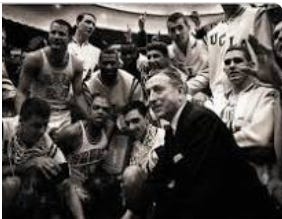Understanding Gen Z Athletes. Considerations That Will Make Us Better Coaches.
Young athletes of today are different than those of previous generations. Not necessarily bad, just different. Let's explore what those differences are and how we can address.
Friends,
If you have been in coaching for a while, you know that kids today are different. That statement can be interpreted negatively, but it is not meant to be so here. When we think of influences on our kids and the environment they grow up in, it only makes sense that they are different.
This week we explore the characteristics of our young athletes as a way to make us better coaches.

From the coaching perspective, preparing our young athletes to be good citizens means helping them develop values and social skills to go along with the actual sports skill development. The health and fitness benefits, building confidence, dealing with disappointment, making good choices, being persistent and resilient are all good objectives and outcomes from sports participation.
Many of these objectives have not changed much at all over the years.
Coach John Wooden, one of the all-time coaching greats focused on helping young athletes develop their full potential. He worked by 3 principles:
· Being in top shape to meet the demands of the game and work hard.
· Work as a team, and never speak badly of another teammate
· Success comes from knowing you did your best.
In addition, he reinforced fundamentals of the commitment of the team including not being late and no profanity.
I don’t know about you, but I feel standards drop when profanity is uses by coaches every 2nd or 3rd word. We are referring to young athletes. 10-20 years old. This may be old school thinking but keeping the pursuit of being at our best starts by eliminating profanity. Rant over.
The Physical Movement documented more about Coach Wooden and his leadership work here.
The Physical Movement is a resource on leadership & youth sports. If you learned something today, please feel free to share or subscribe if not already done so. As a subscriber you receive an email every Sunday with our latest topic.
These principles from one of the greatest coaches of all time where effective then and apply today don’t they?
Coach Wooden started his teaching and coaching career in 1934. The environment and influences of the young athlete has changed dramatically over the years. While the objectives may overlap, the characteristics of the athletes are different. That means the road to connecting with your athletes must be different than years gone by.
If one of our goals coaches is to promote development, then connecting with your young athletes becomes critical.
Let’s start with coaching objectives.
For most of us, it is to provide a positive and constructive experience for those we coach. There are many variations of that from focusing on developing athletes to play at the next level to learning life skills or both. Foundationally, providing a positive experience should be a cornerstone of our objectives.
How to achieve these objectives? Organizations and coaches are spending more and more time developing their knowledge base around the skills of the sport. Certifications are becoming the standard.
Does that knowledge base include a profile of the characteristics of our young athletes?
What about social characteristics? What is important to them? What they like? Where are their character strengths? Weaknesses?
Is it safe to say that the way our young athletes learn, interact with each other, with coaches would be different today than in 2010, 2000 or 1990? Different than how we grew up? Would it be safe to say that young athletes today might react differently to criticism today than years ago? If the answer is yes to these questions, then we should dig in to getting to know our athletes.
Characteristics of the Generation Z student athlete.
One of the business lessons I learned years ago, is to find out as much as you can about your customers before doing anything. For those non-business people, this rule also applies here.
Generation Z have birth years roughly between 1995 to 2010. Millenials or Gen Y are 1981 to 1994. The parents of Generation Z are usually those in Generation X, and Baby Boomer grandparents are common for Generation Z.
Let’s look at Gen X parents for a minute. Gen X parents support their kids, this support also comes across as seeing their kids as doing “no wrong”. There is also not as much disciplining of kids by Gen X as previous generations. We can observe this impact on the field and in practice as not always responding well to authoritative directions, or accountability.
Coaches: take notes when it comes time to outlining what standards are acceptable and not, and how to get that across.
Generation Z athletes comprise those who grew up deeply connected to technology, practically from the moment they became self-aware. Generation Z characteristics are interesting and specific; Generation Z features avid gamers, and they are known for being ever-present messaging, on the internet, on social networks, and on mobile systems—they are truly the “digital-ites.”
As we start to get a picture of who we are coaching, and their parents, how do we use this information?
Developing strategies to be most effective.
With the technology dependent, internet dependent, smartphone dependent young athlete comes characteristics we should address.
Constant dependence on the smart phone means short attention spans and being easily distracted. And like handwriting being used less and less, so are personal communication skills. Face to face communication skills are not always strong.
The opposite of dependence is independence, so lack of independence is a characteristic of Gen Zers. Sense of entitlement. Never having dealt with accountability leads to being poor dealing with adversity or disappointment.
October 25, The Physical Movement took a deeper dive on dealing with disappointment.
Mapping out a plan of attack in connecting with our GenZ athletes.
6 considerations that will make us better coaches.
Explain the 'Why.'
The days of athletes doing what they are told without explanation are mostly over. Having a standard procedure on explaining why drills and activities are being done, while keeping instructional strategies as brief as possible are critical. Providing a quick rationale for training methods and practice plans can improve motivation and effort of young people.
Set clear expectations for practice behavior and engagement.
Guidelines on what is expected as a team member, from behavior to practice habits. From off the field to in game. Setting boundaries in teaching what is acceptable and not, and also teaches how to strive to be better.
Communicate effectively.
This is a timeless principle of coaching and teaching however it is a skill that requires some creativity with today’s young athlete. If face-to-face communication is not a strength of young athletes, then coaches can challenge athletes with open ended questions and asking for input. Switching up methods of communication will support and aid messaging (videos, articles and demos). Also having more than one coach supports the development of communication.
Be direct, short and to the point.
Too often coaches talk too much to get a drill going or at the start of practice. Short messages that are to the point will offset the lack of attention span of today’s young athletes. Multiple communications are fine but be direct and short to the point.
Yes, coaches we need to be organized to make this happen, as outlined in TPM’s recent edition on practice management.
Focus on quality over quantity.
Today’s young athletes are willing to spend more time and money (families) on practice and development on their own than ever before. The rise of sports development academies and centers speaks to this. During team time of practice or games, focusing on quality of instruction is critical. Give the tools for the young athletes to work on away from the field. From individual skills, to strength and conditioning to team study (video etc.). By blending quality with the why, you have a winning combination.
Empower and build independence
Provide choices and challenges your athletes (such as being on time, practicing outside of formal practice). Hold athletes accountable.
By giving athletes some autonomy, choice, and responsibility, athletes can take more ownership and develop skills related to independence. As coaches, finding our sweet spot on guidance is critical. Let the athlete explore and discover on their own as much as possible.
Providing challenges for athletes and supporting them through the process also promotes resiliency.
Gen Z is known to have heightened difficulties dealing with adversity as mentioned earlier. Creating pressure and challenging situations in practice, along with teaching appropriate coping strategies, can assist Gen Z athletes with how to better handle competitive and personal setbacks.
PLAY. LEAD. BE STRONG.
The below articles were used as resources for this article.
https://appliedsportpsych.org/blog/2019/03/coaching-generation-z-athletes/
https://www.getsmarter.com/blog/career-advice/know-your-generationals/





